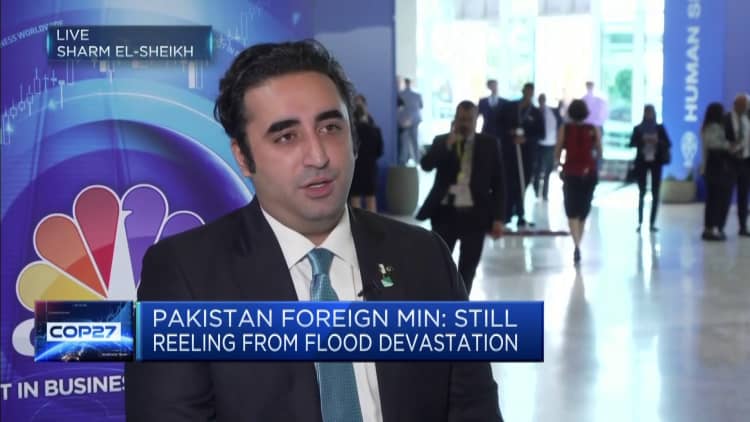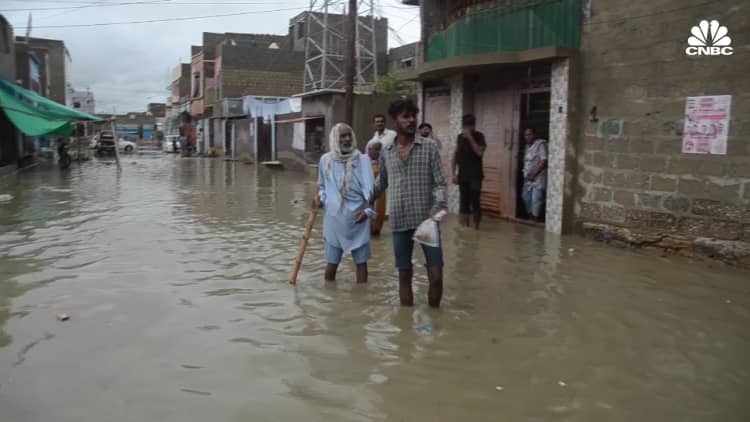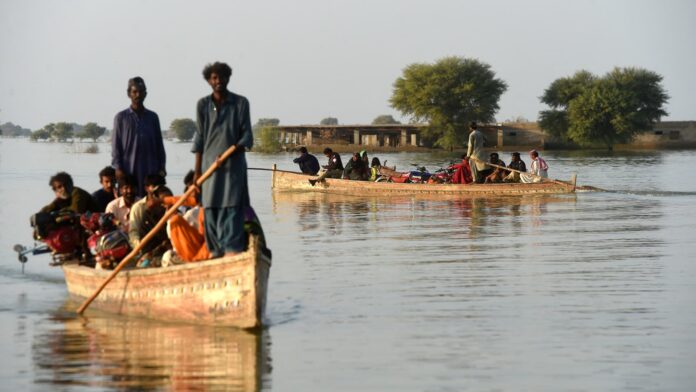SHARM EL-SHEIKH, Egypt — Pakistan’s foreign minister says catastrophic flooding that submerged one-third of the country earlier this year reaffirms the need for wealthy countries to deliver on reparations, a highly contentious issue that has taken center stage at the U.N.’s flagship climate conference.
Reparations, or “loss and damage” funding, are seen as a fundamental question of climate justice. The hot-button issue made history on Sunday at the opening of the COP27 climate summit by being formally adopted onto the agenda for the first time.
The decision to include loss and damage funding as an agenda item, which was proposed by Pakistan, was preceded by 48 hours of talks.
Climate envoys gathered in Egypt’s Red Sea resort town of Sharm el-Sheikh will now discuss a deal on a funding facility that would see wealthy nations provide loss and damage cash to vulnerable countries.
Pakistan’s Bilawal Bhutto Zardari told CNBC that it had been a success to see loss and damage funding finally adopted onto the COP27 agenda, highlighting the role that developing countries played in building consensus on this issue.
He now hopes the international community can find a way to collectively address financing for loss and damage.
“We discovered firsthand through the catastrophic, apocalyptic flooding that we experienced earlier this year, and we are still dealing with the consequences of that, that … an event of this scale [does] not have any international financial mechanism available for us to be able to address a tragedy of this scale,” Zardari told CNBC on Tuesday.

Months of unrelenting rainfall in Pakistan submerged huge swathes of the South Asian nation, displacing millions as the floods swept away homes, transport, crops and livestock. Zardari estimated that the total damage stood at an “astronomical” sum of $30 billion.
Zardari said Pakistan was “cognizant” of the difficult economic environment, citing the impacts of the coronavirus pandemic and Russia’s war in Ukraine, but added that “this has really become a compounding tragedy” for the country.
The disaster highlights the disparity between those most affected by the consequences of a warming planet and those that have the greatest historical responsibility for the climate crisis.
“We can’t deny that loss and damage doesn’t exist. I mean I had a third of my country underwater that will prove otherwise but I don’t want to pitch this as sort of liability or compensation,” Zardari said, referring to a reluctance from wealthy countries to accept liability for loss and damage.
“This is not going to stop at Pakistan,” he warned. “The next country that’s affected should have something available so that they can address the loss and damage.”
‘Not a very constructive agenda’
Rich countries have long opposed the creation of a fund to address loss and damage and many policymakers fear that accepting liability could trigger a wave of lawsuits by countries on the frontlines of the climate emergency.
U.S. climate envoy John Kerry has previously indicated the U.S. would not be prepared to compensate countries for the loss and damage they’ve suffered as a result of the climate emergency.
However, in an apparent softening of that stance, Kerry has since said Washington would not be “obstructing” talks on loss and damage at COP27.
U.S. climate envoy John Kerry said Washington would not be “obstructing” talks on loss and damage in Sharm el-Sheikh.
Bloomberg | Bloomberg | Getty Images
“Loss and damage is important but it is not a very constructive agenda,” Johan Rockstrom, director of the Potsdam Institute for Climate Impact Research and one of the world’s most influential Earth scientists, told CNBC in Sharm el-Sheikh.
“It is at risk of causing a deep divide between the north and the south and can lead these negotiations to grind to a halt when what the world needs most is to haul ourselves away from dangerous climate change,” Rockstrom said. “And now we are on a path that takes us unequivocally to disaster.”
A flurry of major U.N. reports published in recent weeks delivered a bleak assessment of how close the planet is to irreversible climate breakdown, warning there is “no credible pathway” in place to cap global heating at the critical temperature threshold of 1.5 degrees Celsius.
“We know the task that we have had at hand,” said Harjeet Singh, head of global political strategy at Climate Action Network, which includes more than 1,500 civil society groups.
“We should also understand the responsibility that we have here as part of these U.N. negotiations because what we do or don’t do has an impact on people who are already suffering. We are talking about the reality outside these conference walls,” Singh told CNBC.
Months of unrelenting rainfall in Pakistan submerged huge swathes of the South Asian nation.
Asif Hassan | Afp | Getty Images
Asked whether there was a danger that the push for loss and damage funding could see talks at COP27 break down, Singh replied: “What I say to that is that loss and damage was not on the table for the last 30 years and look what has happened.”
“Loss and damage is a report card of inaction for the last 30 years. And loss and damage tells us that there is a consequence now,” Singh said. “Had we talked about loss and damage in 1992, that if we don’t mitigate, you’ll have to pay for loss and damage, you would have got it right in the beginning.”
Finance ‘is the key for everything to happen’
Former U.N. climate chief Patricia Espinosa, meanwhile, told CNBC that climate finance “is the key for everything to happen.”
“It has been the case for quite a number of conferences but now that we are starting an era of implementation, this is the area that will make a difference.”

Espinosa said she was particularly worried about the fact that the $100 billion climate finance pledge by rich nations in 2009 to help low-income nations mitigate and adapt to the climate emergency had still not been met.
“It is at the heart of a certain mistrust that we are seeing so I am coming with a lot of concern about that,” Espinosa said.
“There is a very clear need that the money should be found and I’m not seeing that. However, what I hope can happen is that we can really start to have a very serious and well-informed conversation about financing for loss and damage,” she added.


